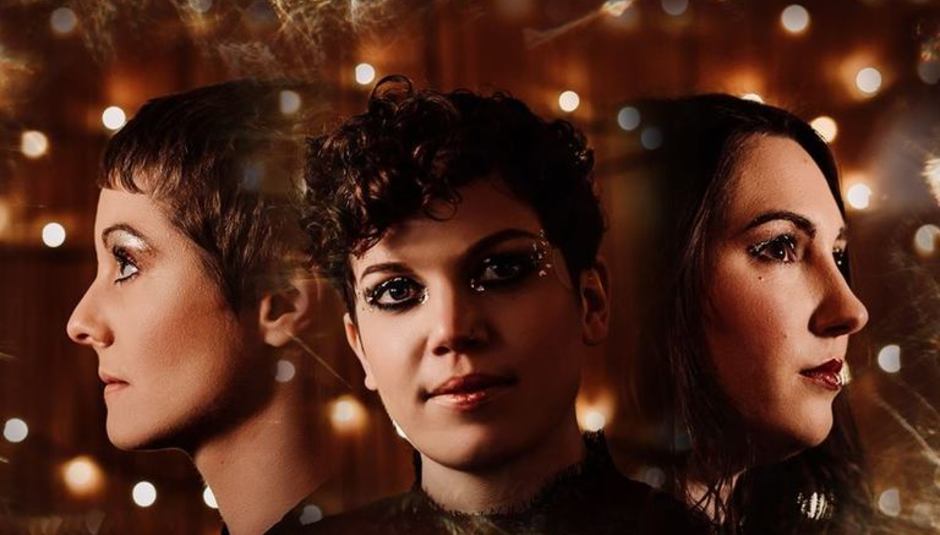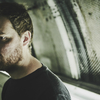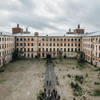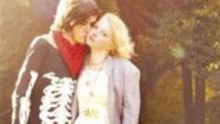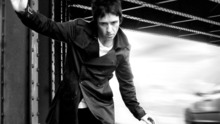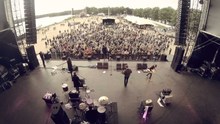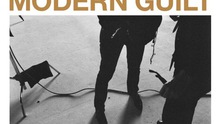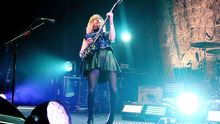Haiku Salut are one of the most uniquely innovative bands on the planet right now and have been for the best part of a decade. Formed in the Peak District of Derbyshire after the dissolution of their previous band The Deirdres back in 2010, the trio - multi-instrumentalists Sophie Barkerwood, Louise Croft, and Gemma Barkerwood - have continued to push boundaries beyond classification ever since their first EP How We Got Along After The Yarn Bomb landed unsuspectingly seven years ago.
Since then, they've put out three albums, the latest of which, There Is No Elsewhere, came out earlier this month, receiving an impressive 8/10 on these very pages. Last year saw them collaborate with Public Service Broadcasting on the track 'They Gave Us A Lamp', while they're also currently in the process of putting together a score for a play about 17th century mathematical genius Ada Lovelace.
Later this month they head out on tour with their critically acclaimed lamp show which combines the band's music with visual elements based around a haunted living room having just completed a run of Rough Trade in-stores, which is where we caught up with them.
There's a three year gap between 2015's Etch And Etch Deep and this year's There Is No Elsewhere. When did the ideas first materialise for the new record and how long did it take to put together?
Gemma Barkerwood: Constantly over the past three years really. We had bits that we wrote right at the beginning. The way we write is to put together little sections of music then try and find them a home with other bits.
Sophie Barkerwood: Patchwork things together I guess...
GB: There's one particular sample on 'The More And Moreness' that we wrote on Christmas Day about three or four years ago.
SB: There were bits hanging around before the last album came out. It all came together about a year ago. It was finished and mastered then but it's taken a long time to get the organisational side of things in place. Our previous albums came out on How Does It Feel To Be Loved and Ian (Watson) who runs the label is also our manager, so he wanted to get someone else to release the album. A few people were interested but it didn't work out, so we went it to Stephen (Bass) at Moshi Moshi, and he asked us if we'd like to be on his electronic and neo-classical label PRAH. I think it's quite a good home for us. He's been really helpful and supportive. Once that was in place we could finally put the record out, but it wasn't very nice for a while not knowing what was going to happen.
The album represents a marked progression from its predecessor, in particular the brass elements. How did Glastonbury Brass become involved?
GB: That's something we've wanted to do on all the albums but this was the first time we had the opportunity to follow it through. Initially, we tried to work with some local brass bands. I thought it would be a nice thing because the album is about having that sense of community. But we were quite lucky because one of our friends' dads plays the tuba in Glastonbury Brass.
SB: We asked a few brass bands without knowing what level they were at, so we asked Glastonbury Brass and they were well up for it. We took a trip down there and they were an amazing, proper championship level band. They could have been shit but they weren't. We were lucky in that was probably the best thing I've ever seen.
GB: It would have been nice to work with someone more local too but they weren't as enthusiastic about what we were doing as Glastonbury Brass were.
SB: We really wanted this album to be uplifting. The past few years have been notoriously crap, both politically and environmentally. It's been a really stressful time for a lot of people. We would write and rehearse as a way of escaping from all of that, but at the same time, it was also a response to what was going on in the world around us. If you can work better together that's got to be a good thing. So the brass band really helped the mood of the album.
Will the brass band be involved in the live shows?
GB: At the minute we're using a sample of the band while Louise has been given the horrific task of learning the trombone! It's a big ask but she's pulled it off so for now, we have a trumpet and trombone backing. For the lamp shows, we've got an eight-piece brass band. I guess it's more of a logistical thing.
SB: I'd quite like to do something involving brass musicians local to the area we're playing in a similar way to what British Sea Power did with Sea Of Brass tour. Their show was amazing.
GB: I think it was probably around the same time we saw that show we thought maybe something similar could work for us?
You mention the album being "uplifting" and about "a sense of community." Did you have a specific theme in mind before you started making the record or did it just happen gradually?
SB: It happened gradually. A couple of songs were written before we realised what we wanted to say, then we tinkered with them afterwards to make them more thematic in line with the rest of the album. So it wasn't necessarily from the outset we knew. It was a gradual process, maybe three or four songs in. Once the artwork was in place that really helped shape the album's expression.
How does the artwork tie in with the record? How did that manifest itself?
GB: So Geoff Diego Litherland is a very talented artist that lives in the next village down from us. I've loved his work for a long time. He creates a lot of challenging images that are quite bleak yet beautiful. So we had the idea of wanting the album to be about something hopeful at a bleak time and we felt Geoff's artwork really tied in with that.
SB: It has undertones of a warning about there is no elsewhere so if we don't start looking after "it" these are the consequences.
GB: It's a dual thing in that we've got ourselves in a position that's horrific where people idolise what was good about the past with the opposite being if we don't put things right now we're going to have a terrible future.
SB: Definitely the future if you think about Brexit.
Do you think Brexit will happen?
SB: I've always maintained the further we get along with it the last chance there is of it happening, so no, I don't think it will. Everybody that pioneered Brexit, who skewered people's views and lied to them, have all gone now. So they know it's all gone to shit, and if those are the people that wanted this to happen in the first place then what about the rest of us that didn't? It just doesn't make sense.
The implications are terrifying if it does happen, particularly with the arts and music which isn't supported by the UK government as things stand. Does all of this impact on or influence your writing?
SB: Not so much musically but it's always in the back of our minds.
Some of the songs that made it onto There Is No Elsewhere have been in your live set for a while. Is that something you normally do, try songs out live first and if it works, record them afterwards?
GB: We talk about this a lot with other friends who are musicians, particularly Mach from Grawl!x who comes up with about one thousand masterpieces every day. Whereas we've always really chiselled at things. So by the time certain parts make it into a fully formed song, they've been hacked apart so much there's no room for it to be dismissed any more.
SB: Some songs we've worked at live and they've taken a lot more effort. Mainly because they're quite difficult to play live. We give them all a chance, but some of them don't work and end up getting dropped.
GB: We never drop a song from the album but we often have from the live set if it doesn't work with the rest of what we want to play. We don't put any restrictions on songs the way we write. We just decide which instruments we're going to use then work out how we're going to perform it.
SB: There have been other songs where that's been turned on its head. We've worked out certain things then recorded it and then changed them after. Not so much with this album, but definitely on the other two. This album was more structured. It was a case of "right, we've written it. Now how are we going to play it?"
GB: Louise, go and learn the trombone!
Are there any songs that were written or demoed around the time you were making There Is no Elsewhere which didn't make it onto the album that might be revisited in the future?
GB: We've got lots of bits of songs.
SB: Ideas and melodies and atmospheres in a folder! So one day, Gemma will write something and we'll have this perfect noise to complement it that's been hanging around for a while. Sometimes songs come together really quickly. Other times it can take a year or even longer. I feel like I know when something is finished but sometimes the others don't! That's probably the only thing we grumble at each other about.
Reviews so far have not only been positive, but you've also been covered by a lot more of the mainstream press than on previous releases. Why do you think that is?
GB: I feel being on PRAH has opened us up to quite a few different audiences. We've been sat in the indie pop world from day one because of our history and involvement with that scene. Creatively it's a much better record than the other two. But then I guess it would be a bit worrying if I thought it was worse!
SB: We're so involved in the creative side of things so it feels nice to get all these positive reviews. It's nice to know some people really get it without us having to prompt them in the right direction.
GB: Some of the reviews have really nailed it better than I could ever describe what the record sounds like. So that in itself shows we've achieved what we wanted to do with this album.
Do you see yourselves working with PRAH long term in the future?
SB: Stephen has already asked us how long it will be until new music happens so that's promising for a start!
How long will it be until new music happens?
SB: The songs dictate that. It could be two weeks, it could be years.
GB: This album's still pretty fresh even though it's been going on for a while. Let's see what happens.
SB: We only met Stephen for the first time on Saturday. That was the first time he'd seen us live when we played at Rough Trade East in London. He said it was magic so that's good!
You're going out on tour for the last two weeks in September performing your lamp show. Where did that concept originate from?
GB: Me and Sophie went to see Dan Deacon in Manchester and he had one lamp on his set up. It was just a bulb which he used during one song. He hatched it so it responded to what he was doing on midi. We got talking to him afterwards and the lamp show grew from that really.
SB: That's where it came from. I think the lamp show works really well in interesting venues and unorthodox places. It creates a special show for people that's much more memorable than if it were in a bog standard venue. Also, the lamps have lit up the nooks and crannies of churches and libraries when we've played them.
Are there only certain songs which work in that context? Is the set tailored specifically for the lamp shows?
GB: I think some work better than others because the lamps are triggered by Sophie using midi signals from her laptop, so it mirrors the songs that are more glitchy. Those are the ones that work best.
SB: I think it really shows them off.
GB: But then some of the really ambient ones played on the piano work too.
SB: It's nice to have a good mix. It would be a bit much if we made the show too flashy. It would be quite overwhelming so it's good to be able to bring it down with something more atmospheric.
You collaborated with Public Service Broadcasting last year on 'They Gave Us A Lamp'. How did that come about? Do you see yourselves working with them again in the future?
GB: It came about after we played a festival (Farmfest) and they asked us to put together a playlist of music.
SB: They gave us a theme, and we chose the best songs we'd seen performed live. We chose 'Gagarin' even though it didn't really fit in with the rest of the playlist so we stuck it on the end. It seemed a shame for it not to be included, so we sent it off hoping they might put it on their blog or premiere it somewhere. No one took it up, so they just tweeted about this thing on Mixcloud we'd done, and J. Willgoose must have seen it. He heard 'Hearts Not Parts' and got in touch to say they'd been writing a song with a certain vocal line in it so would we be interested in writing something with him. So we said yes! It was a really tenuous thing. That Mixcloud might never have gone up or might have been posted later when he was out so might never have heard it. You have to take every opportunity when it comes because you never know what might happen.
GB: I remember doing a lamp show gig at this amazing venue in London one year and a lot of people were there but none of them were press or photographers so nothing came of it. Then other times we've played small venues in random places where we thought there'd be no one and something's come from it.
SB: Like Liverpool Sound City when they moved us into a little tent that was on the back of another stage where we were completely drowned out. We couldn't hear what we were doing, but one guy came to see us and he's put us on in Morecambe several times since. We played this festival for him and Tyson Fury turned up wearing just a tie and blazer with no shirt underneath!
Haiku Salut have always managed to avoid being pigeonholed by any specific genre and never really attached themselves to any scene or fad. Do you think that's been pivotal to the band's longevity?
SB: Probably, because people don't know where to stick us. I don't like the idea of genre. I think it's transcending, like you've got something to fight against.
GB: It can be bad too. We can't get a booking agent because they don't know what to do with us which then means we don't get to play as many festivals as we like because bookers don't know where to stick us. But then at the same time, we still get lots of gig offers where we end up playing to a fresh audience. Particularly on this album.
What advice would you give to a new band that's just starting out?
SB: Don't write music that you think other people will want to like. That's really important if you want to keep your integrity.
GB: Never chase what you think other people might like. You could end up writing something you think is going to be well received that ends up being liked by nobody.
SB: Make sure your work station is always set up so when you're ready to write music it's already there. Because the last thing you want to do is fuck about with wires and plug everything in then by the time you've done all that, forgotten about what you're intending to write in the first place.
Are there any new bands or artists you'd recommend for Drowned In Sound and its readers to check out?
SB: I've been listening to a lot of drone recently. I don't know if they're new but Hotel Neon make radiant, dense drone that's definitely worth checking out. Also, Tiny Leaves who's supporting us in London makes really lovely piano music.
GB: There's a guy we saw recently with Baths. I'm not sure if he's new but Mountain Range is brilliant.
SB: He's great. He makes really melodic, ambient electronica that's so absorbing it demands your attention.
After the tour has finished, what are your plans for the rest of 2018?
SB: We're going to take a week or two off, then we're going to be working on a musical composition for a play about Ada Lovelace. It was meant to happen this year but it got postponed, so that will start up again. Ada Lovelace is considered to be the first computer programmer. In theory, she wrote the maths behind it all.
GB: A lot of her work was credited to Charles Babbage, so we're writing a score for the piece. We're also making some integrated trigger points on the stage so actors can play instruments but not make any sounds whilst using the props.
Do you see score writing as something you'd like to become more involved with in the future?
GB: Yeah, definitely. We have a few potential offers on the periphery.
SB: The other thing we're doing is releasing a virtual reality video for our next single which should be coming out soon. We did a virtual reality event in Derby for our album launch and we're hoping to do some more in the future. It was really amazing and quite emotional at times. So we're going to do some events to promote the video so people can see it as it's intended to be seen as a lot of people don't have VR headsets.
What made you choose The Old Bell as the venue for your album launch?
SB: That's where we filmed the video so we wanted to be back in that space for the album launch so there is no elsewhere. You're in that space wearing your VR headset and you can see all these things forming and happening around you. So that's why we chose The Old Bell.
GB: The lamp show is meant to be a haunted living room so I guess that seems to be our theme!
There Is No Elsewhere is out now via PRAH Recordings. For more information on Haiku Salut, including forthcoming tour dates and where to purchase tickets, please visit their official website.

